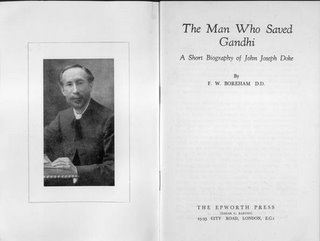 As a small boy I took for granted that Paul's famous phrase about entertaining angels unawares was a piece of pure hyperbole, a poetical expression coined as an incentive to hospitality. Soon after our marriage in New Zealand, however, my wife and I discovered that this glittering gem of apostolic diction represents a nugget of stark and sober fact.
As a small boy I took for granted that Paul's famous phrase about entertaining angels unawares was a piece of pure hyperbole, a poetical expression coined as an incentive to hospitality. Soon after our marriage in New Zealand, however, my wife and I discovered that this glittering gem of apostolic diction represents a nugget of stark and sober fact.We were ridiculously young, she and I, when we built our first home at Mosgiel in New Zealand: she was still in her teens. New Zealand, too, was young: we were able to chat, every day of our lives, with men and women who had come out on the very first emigrant ships. Strangers in so strange a land, we struggled bravely to make ourselves at home. And, on the whole, we managed fairly well until Christmas came. But when Christmas came in the hot blaze of midsummer, the fields around us aglow with golden harvests, it was too much for us. We felt wretchedly lonely and horribly homesick. Well meaning people wished us a merry Christmas. As if anybody could be merry under such conditions!
In those far-off days, however, it was our ineffable delight to welcome to our manse one happy guest who invariably brought his Christmas with him. Whenever he entered our Mosgiel manse, every room echoed with the Glory to God in the Highest of the Bethlehem angels; and, whenever the front-door bell rang, we half suspected that, out in front of the house, we should see the Wise Men with their train of camels.
The man who set the angels singing in the Mosgiel manse was Joseph John Doke, Although one of the most dynamic and colourful personalities who ever spent a few years beneath these mistral stars, he was of so modest and unassuming a disposition that those within whose minds the mention of his name now awakens any responsive vibrations must be exceedingly few. And of those who were privileged to enjoy his companionship, scarcely anybody suspected that his whole life was an epic of romance and adventure.
It chanced that in 1894, two churches in New Zealand needed ministers. The city pulpit at Christchurch was vacant; and the little church at Mosgiel, that had never indulged in a minister before, resolved with great trepidation to venture on the momentous experiment. Both sent to England. Mr. Doke was appointed to Christchurch, and I, fresh from college, was allocated to Mosgiel. And so we met in Maori-Land; and, as the first of the many notable services that he rendered me, he officiated at my wedding.
(To Be Continued)
F W Boreham


